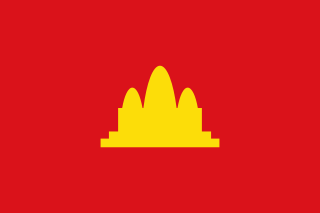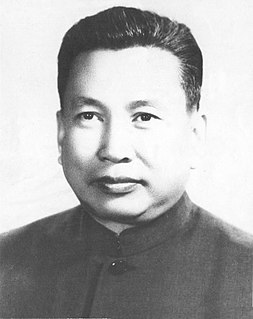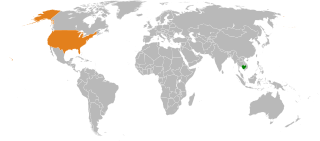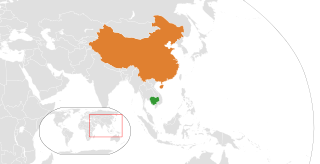The history of Cambodia, a country in mainland Southeast Asia, can be traced back to Indian civilization. Detailed records of a political structure on the territory of what is now Cambodia first appear in Chinese annals in reference to Funan, a polity that encompassed the southernmost part of the Indochinese peninsula during the 1st to 6th centuries. Centered at the lower Mekong, Funan is noted as the oldest regional Hindu culture, which suggests prolonged socio-economic interaction with maritime trading partners of the Indosphere in the west. By the 6th century a civilization, called Chenla or Zhenla in Chinese annals, firmly replaced Funan, as it controlled larger, more undulating areas of Indochina and maintained more than a singular centre of power.

The Khmer Rouge is the name that was popularly given to members of the Communist Party of Kampuchea (CPK) and by extension to the regime through which the CPK ruled Cambodia between 1975 and 1979. The name was coined in the 1960s by then Chief of State Norodom Sihanouk to describe his country's heterogeneous, communist-led dissidents, with whom he allied after his 1970 overthrow.

Pol Pot was a Cambodian revolutionary, dictator, and politician who ruled Cambodia as Prime Minister of Democratic Kampuchea between 1976 and 1979. Ideologically a Marxist–Leninist and a Khmer nationalist, he was a leading member of Cambodia's communist movement, the Khmer Rouge, from 1963 until 1997 and served as the General Secretary of the Communist Party of Kampuchea from 1963 to 1981. Under his administration, Cambodia was converted into a one-party communist state and perpetrated the Cambodian genocide.

Cambodia, officially the Kingdom of Cambodia, is a country located in the southern portion of the Indochinese Peninsula in Southeast Asia, spanning an area of 181,035 square kilometres, bordered by Thailand to the northwest, Laos to the north, Vietnam to the east, and the Gulf of Thailand to the southwest. The capital and largest city is Phnom Penh.

The Kingdom of Cambodia, also known as the First Kingdom of Cambodia, and commonly referred to as the Sangkum period, refers to Norodom Sihanouk's first administration of Cambodia from 1953 to 1970, an especially significant time in the country's history. Sihanouk continues to be one of the most controversial figures in Southeast Asia's turbulent and often tragic postwar history. From 1955 until 1970, Sihanouk's Sangkum was the sole legal party in Cambodia.

The Cambodian Civil War was a civil war in Cambodia fought between the forces of the Communist Party of Kampuchea against the government forces of the Kingdom of Cambodia and, after October 1970, the Khmer Republic, which had succeeded the kingdom.

Hun Sen is a Cambodian politician and former military commander who has served as the prime minister of Cambodia since 1985. He is the longest-serving head of government of Cambodia, and one of the longest-serving leaders in the world. He is also the president of the Cambodian People's Party (CPP) and a member of the National Assembly for Kandal. His full honorary title is Samdech Akka Moha Sena Padei Techo Hun Sen.

Kriangsak Chamanan served as prime minister of Thailand from 1977 to 1980. After staging a successful coup, he was asked to become Prime Minister in 1977, he ruled till 1980 and is credited with "steering Thailand to democracy" in a time where internally, communist insurgents are rampant and neighbouring countries have turned to communist rule following the communist takeover of Vietnam: South Vietnam, Laos, and Cambodia. He died on 23 December 2003, aged 86.

The Cambodian–Vietnamese War, known in Vietnam as the Counter-offensive on the Southwestern border, and by Cambodian nationalists as the Vietnamese invasion of Cambodia, was an armed conflict between Democratic Kampuchea, controlled by the Khmer Rouge, and the Socialist Republic of Vietnam. The war began with repeated attacks by the Liberation Army of Kampuchea on the southwestern border of Vietnam, particularly the Ba Chuc massacre which resulted in the deaths of over 3,000 Vietnamese civilians. On 25 December 1978, Vietnam launched a full-scale invasion of Kampuchea, and subsequently occupied the country and removed the government of the Communist Party of Kampuchea from power.

Nuon Chea, also known as Long Bunruot or Rungloet Laodi, was a Cambodian communist politician and revolutionary who was the chief ideologist of the Khmer Rouge. He also briefly served as acting Prime Minister of Democratic Kampuchea. He was commonly known as "Brother Number Two", as he was second-in-command to Khmer Rouge leader Pol Pot, General Secretary of the Party, during the Cambodian genocide of 1975–1979. In 2014, Nuon Chea received a life sentence for crimes against humanity, alongside another top-tier Khmer Rouge leader, Khieu Samphan, and a further trial convicted him of genocide in 2018. These life sentences were merged into a single life sentence by the Trial Chamber on 16 November 2018. He died while serving his sentence in 2019.

The Coalition Government of Democratic Kampuchea, renamed in 1990 to the National Government of Cambodia, was a coalition government in exile composed of three Cambodian political factions, namely Prince Norodom Sihanouk's FUNCINPEC party, the Party of Democratic Kampuchea and the Khmer People's National Liberation Front (KPNLF) formed in 1982, broadening the de facto deposed Democratic Kampuchea regime. For most of its existence, it was the internationally recognized government of Cambodia.

Kampuchea, officially known as Democratic Kampuchea from 5 January 1976, was a one-party totalitarian state which encompassed modern-day Cambodia and existed from 1975 to 1979. It was controlled by the Khmer Rouge (KR), the name popularly given to the followers of the Communist Party of Kampuchea (CPK), and was founded when KR forces defeated the Khmer Republic of Lon Nol in 1975.

The People's Republic of Kampuchea (PRK) was a partially recognised state in Southeast Asia supported by Vietnam which existed from 1979 to 1989. It was founded in Cambodia by the Kampuchean United Front for National Salvation, a group of Cambodian communists who were dissatisfied with the Khmer Rouge due to its oppressive rule of Cambodia and defected from it after the overthrow of Democratic Kampuchea, Pol Pot's government. Brought about by an invasion from Vietnam, which routed the Khmer Rouge armies, it had Vietnam and the Soviet Union as its main allies.

Bilateral relations between the United States and Cambodia, while strained throughout the Cold War, have strengthened considerably in modern times. The U.S. supports efforts in Cambodia to combat terrorism, build democratic institutions, promote human rights, foster economic development, eliminate corruption, achieve the fullest possible accounting for Americans missing from the Indochina Wars-era, and to bring to justice those most responsible for serious violations of international humanitarian law committed under the Khmer Rouge regime.

Cambodia–Vietnam relations take place in the form of bilateral relations between the Kingdom of Cambodia and the Socialist Republic of Vietnam. The countries have shared a land border for the last 1,000 years and share more recent historical links through being part of the French colonial empire. Both countries are members of the Association of Southeast Asian Nations (ASEAN).

The bilateral relations between the Kingdom of Cambodia and the People's Republic of China have strengthened considerably after the end of the Cambodian–Vietnamese War, during which China had supported the Khmer Rouge against Vietnam.

The Communist Party of Kampuchea (CPK), also known as the Khmer Communist Party, was a communist party in Cambodia. Its leader was Pol Pot and its followers were generally known as the Khmer Rouge. Originally founded in 1951, the party was split into pro-Chinese and pro-Soviet factions as a result of the Sino–Soviet split with the former being the Pol Pot faction, and the latter adopting a more revisionist approach to Marxism. As such, it claimed 30 September 1960 as its founding date, then as the Workers' Party of Kampuchea before being renamed the Communist Party in 1966.

The Cambodian genocide was the systematic persecution and killing of Cambodians by the Khmer Rouge under the leadership of Communist Party of Kampuchea general secretary Pol Pot, who radically pushed Cambodia towards an entirely self-sufficient agrarian socialist society. It resulted in the deaths of 1.5 to 2 million people from 1975 to 1979, nearly a quarter of Cambodia's 1975 population.

Cambodia–Malaysia relations are foreign relations between Cambodia and Malaysia. Both countries are members of ASEAN. Cambodia has an embassy in Kuala Lumpur, and Malaysia has an embassy in Phnom Penh.
Anti-Vietnamese sentiment involves hostility or hatred that is directed towards Vietnamese people, or the state of Vietnam.

















